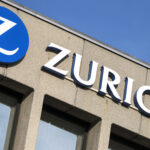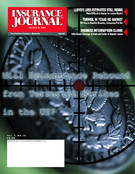The financial and human losses from the events of Sept. 11 continue to haunt insurance companies at home and around world.
Insurers have been assessing the impact and are beginning to pay claims with an as yet undetermined effect on third-quarter profits.
Initial loss estimates by various analysts still fall in the $30 billion to $40 billion range.
A majority of larger U.S. and European insurers have indicated that the attacks do not qualify as an act of war, and thus will not invoke the act-of-war exclusions present in most property and liability policies (see Legal Beat, this issue page 22).
If other insurers take the same position, the implication would be that insurance companies globally would have to turn over the $30 billion or so in claims expected by industry experts in relation to the destruction of Sept. 11.
A number of companies, which include Ace Ltd. (estimated losses $550 million), Hartford Financial Services Group Inc. ($450 million) and The St. Paul Companies ($700 million) have joined a list of insurers who noted they would not invoke the provision.
Chubb Corp. released a statement following the attacks noting that the act-of-war exclusion did not apply to Sept. 11 events, and that it expects to pay out between $500 million and $600 million for the attack.
Testifying before the House Financial Services Committee last month, Chubb CEO and Chairman Dean O’Hare cautioned that while this event would be handled, a series of terrorist attacks or other catastrophes of a similar nature would bring up the question of the industry’s solvency.
O’Hare noted that Americans will demand greater coverage for terrorism-related risks. “Unfortunately, it is becoming apparent that as current reinsurance agreements expire, they will be renewed only with a terrorism exclusion, and therefore it will be impossible to provide our customers with terrorism coverage.”
One thing O’Hare is calling for from Congress is the formation of an insurance pool for terrorism coverage similar to the one that was formed in the United Kingdom following terrorist acts related to the conflict in Northern Ireland.
In an interview published in the Sept. 15 edition of Finanz und Witschaft newspaper, Bruno Porro, a member of the executive committee at Swiss Re, noted that the insurance industry has no choice but to pay, for political reasons as well. Also, according to Porro, terrorism exclusions probably will not apply to these claims.
Swiss Re officials report that the after-tax effect of the event to the company will eat away at nearly two-thirds of the year 2000 annual profit. Swiss Re notes that the largest exposure is derived from property and business interruption. The company does note, however, that it has committed special resources to help clients in managing the unprecedented claims.
Zurich North America is another company that has said it will not invoke act-of-war exclusions on any policies that present claims related to the attacks. John Amore, CEO of Zurich North America, noted that the company has a solid capital base and remains financially and operationally strong. Amore stated that, working with its broker partners, Zurich will meet the business challenges triggered by these attacks.
Industry analysts have pointed out that some smaller insurers will not be able to pay claims, and thus may resort to invoking the exclusions. However, according to information released by the National Association of Insurance Commissioners, policyholders can be somewhat at ease, knowing that the U.S. insurance industry is a $1-trillion industry with assets of more than $3 trillion. Therefore, preliminary loss estimates of $30 billion represent only 3 percent of the premiums written in 2000.
In addition, the country’s insurance companies have time and again shown their ability to respond to and recover from other significant disasters. Adjusted for inflation, Hurricane Andrew in 1992 caused $19.65 billion in insured losses and the Northridge Earthquake in 1994 caused $16.28 billion in insured losses.
While the financial toll continues to mount for a number of insurance companies, the toll of losing loved ones and colleagues has had a more profound impact on company officials, including those at Aon Corp. and Marsh. Both companies had a significant presence in the World Trade Center, and together the two have reportedly listed more than 500 employees as missing following the attacks.
Aon spokesman Stephen Ban noted that the last few weeks have been especially difficult for company employees who have lost some 200 co-workers.
According to Ban, there were temporary employees along with people who were there for meetings from outside when the buildings collapsed.
“We have provided travel support for families who had immediate family members critically injured or are missing who wanted to come to New York City,” Ban said. “One of the airlines was good enough to arrange a way for employees to donate miles. People kept asking ‘How can I help?'”
Just how much did Aon lose in this disaster as far as the human toll? Ban said the impact has deeply affected Aon CEO Patrick Ryan.
“We had people missing from virtually all parts of the company and all sorts of seniority,” Ban said. “I think it is fair to say that Patrick looks at the people that work here as his extended family.”
While the human factor is the most important part of the equation, Ban knows the business aspects needed to be addressed as well.
Topics Catastrophe Trends Carriers Profit Loss Aon
Was this article valuable?
Here are more articles you may enjoy.


 What Analysts Are Saying About the 2026 P/C Insurance Market
What Analysts Are Saying About the 2026 P/C Insurance Market  Zurich Reveals Beazley Stake After UK Insurer Spurns Bid
Zurich Reveals Beazley Stake After UK Insurer Spurns Bid  Winter Storm Fern to Cause Up to $6.7B in Insured Losses
Winter Storm Fern to Cause Up to $6.7B in Insured Losses  India’s GIFT City Attracts Lloyd’s and Other Global Reinsurers, Sources Say
India’s GIFT City Attracts Lloyd’s and Other Global Reinsurers, Sources Say 


